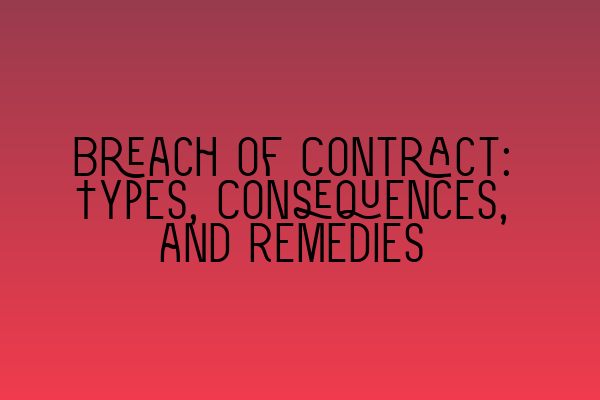Breach of Contract: Types, Consequences, and Remedies
Contracts are an integral part of any business transaction, providing a legal framework that ensures parties involved are bound to their promises. However, there are instances when one party fails to fulfill their obligations, leading to a breach of contract. Understanding the types of breach, the consequences that follow, and the available remedies is crucial for anyone involved in contract law.
Types of Breach
A breach of contract can occur in different ways, with varying degrees of severity. The three main types of breach include:
- Material Breach: This type of breach is significant and has a substantial effect on the contract’s purpose. It occurs when a party fails to perform a fundamental obligation stated in the contract. For example, if a supplier fails to deliver the promised goods within the specified timeframe, it would be considered a material breach.
- Minor Breach: Also known as a partial breach, this occurs when a party fails to fulfill a relatively minor aspect of the contract. While it does not affect the overall purpose of the contract, it still violates the agreed-upon terms. An example is if a contractor completes a project but fails to provide the specified brand of paint.
- Anticipatory Breach: This occurs when one party expresses an unwillingness or inability to fulfill their contractual obligations before the agreed-upon deadline. It can be inferred through statements, actions, or a clear indication that performance will not be completed as promised. In such cases, the innocent party can treat it as a breach and seek legal remedies.
Understanding the types of breach is essential as it helps determine the appropriate course of action and the remedies available.
Consequences of Breach
When a breach of contract occurs, it can have significant consequences for both parties involved. Some of the consequences may include:
- Damages: The innocent party may be entitled to claim damages to compensate for any financial losses incurred as a result of the breach. Damages can be awarded to cover both actual losses (compensatory damages) and losses caused by the breaching party’s misconduct (consequential damages).
- Specific Performance: In certain cases, the court may order the breaching party to fulfill their obligations as stated in the contract. This remedy is typically used when the subject matter of the contract is unique, such as a rare piece of artwork or a specific property.
- Rescission: Rescission allows the innocent party to cancel or terminate the contract, treating it as if it never existed. This remedy is usually available in cases where there has been a serious breach of contract.
- Reformation: Reformation involves modifying the terms of the contract to reflect the original intention of the parties, thereby rectifying any ambiguities or inconsistencies. This remedy is typically used when there is a mutual mistake or when the contract terms are unfair or unconscionable.
The specific consequence of a breach of contract depends on the nature of the breach, the terms of the contract, and the applicable laws in the jurisdiction.
Remedies for Breach of Contract
When faced with a breach of contract, the innocent party has several remedies available to seek redress. These remedies include:
- Compensatory Damages: This remedy aims to compensate the innocent party for their actual financial losses resulting directly from the breach. The damages awarded are meant to put the innocent party in the same financial position they would have been in had the contract been performed as promised.
- Consequential Damages: Consequential damages go beyond compensatory damages and cover additional losses that result indirectly from the breach. These damages may include lost profits, damage to reputation, or other consequential losses.
- Specific Performance: As mentioned earlier, specific performance is a remedy where a court orders the breaching party to fulfill their contractual obligations. It is typically used when monetary compensation is considered inadequate or when the subject matter of the contract is unique.
- Injunctive Relief: Injunctive relief involves obtaining a court order that prohibits the breaching party from performing certain acts or requires them to perform specific acts. This remedy is commonly sought when monetary compensation is not sufficient to rectify the harm caused by the breach.
It is important to consult with a qualified contract law solicitor to determine the most appropriate remedy based on the specific circumstances of the breach.
Understanding breach of contract, its types, consequences, and available remedies is crucial for individuals and businesses engaged in contractual agreements. By being aware of your rights and the options available, you can protect yourself and seek appropriate recourse when a breach occurs.
For more information on related topics, check out these articles:
- Interpreting Contractual Clauses: Unlocking the Hidden Meanings
- Agreements in Contract Law: Understanding Its Various Types
- Essentials of Consideration: Understanding the Basis of Contractual Exchange
- Contract Law Tutorials: Simplifying Complex Concepts for Students
- Discharge of Contracts: Modes and Consequences Explained
By expanding your understanding of contract law, you can navigate the complexities with confidence and ensure your rights are protected.
